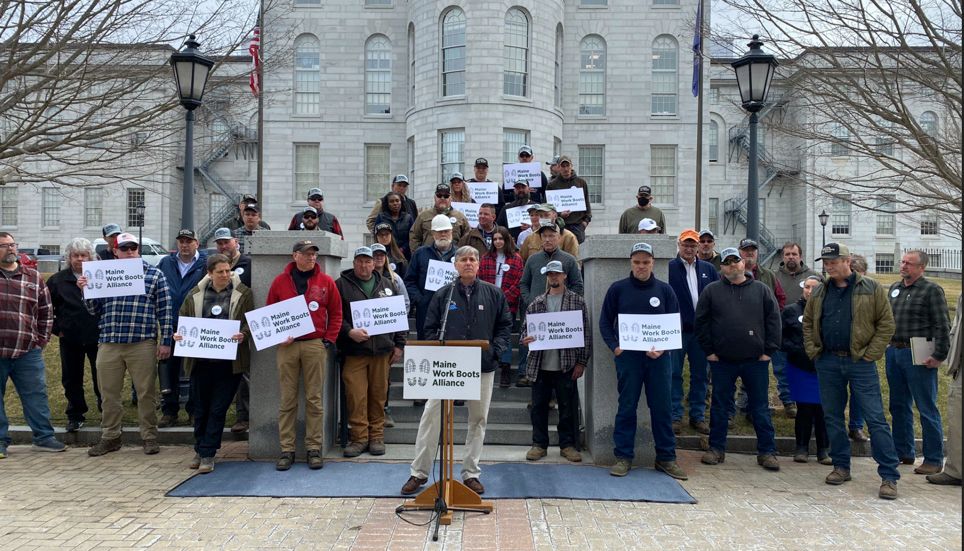The superintendent of the Scarborough Sanitary District asked lawmakers Thursday to support a Republican-backed compromise on a bill aimed at banning the use of sludge on farm fields.
“Don’t let bad practices of the past stop sound, scientifically based, good environmental practices of today,” said David Hughes, one of about 50 members of the newly formed Maine Work Boots Alliance to come to the State House.
The alliance, which is made up the Maine Farm Bureau, Maine State Chamber of Commerce, the compost arm of trash company Casella and several municipal sewage districts, was formed specifically to oppose a ban on biosolids proposed in LD 1911. The bill was prompted by the discovery of PFAS, known as forever chemicals, on farm fields and in well water on farms across the state. The industrial chemicals have been linked to certain types of cancers and other health problems and do not break down in the environment.
Lawmakers have proposed several ways of addressing the problem, including creating a $100 million fund to cover affected farmers’ health and business costs, buy or sell contaminated land, study the chemicals’ impact on different crops and more. That fund gained Senate approval Thursday.
The sludge that led to the problems was spread on Maine farm fields from the 1970s to the 2000s.
In late February, a group of mostly organic farmers and farm groups supporting the sludge ban in LD 1911 called on lawmakers to support the bill. On Thursday, those who support enhanced sludge testing — rather than a ban — made their voices heard.
Hughes said the majority amendment of the LD 1911, which is backed by nine Democrats and Sen. Rick Bennett (R-Oxford), would be costly and would result in landfills filling up faster because the sludge would no longer be allowed to be spread on farm fields.
As it is now, Hughes says Scarborough pays $85 a ton to get rid of sludge, but he predicts the costs will double if the bill is enacted. Those costs would then be passed on to sanitary district customers, he said.
A minority amendment of LD 1911, supported by the Maine Work Boots Alliance, is sponsored by Rep. Jeff Hanley (R-Gardiner) and Rep. Beth O’Connor (R-Berwick). The amendment would require the Maine Center for Disease Control and Prevention and Department of Environmental Protection to set limits on the presence of PFAS in sludge.
He said those agencies already set standards for other hazards such as radon and arsenic, both of which are found in Maine air and water.
“We do rely on science to set up safe levels for all types of contaminants,” he said.
On the other side of the issue, Adam Nordell of Songbird Farm in Unity said because the PFAS doesn’t break down, a total ban is necessary.
“We can’t rely on the old logic of the solution to pollution is dilution,” he said. “That is not true in this case. They accumulate and they are going to be here forever. Our understanding of the dangers at even low levels are real. This is not the time to ask for more leniency.”
Farmer Courtney Hammond of Harrington, who does not use sludge at his farm but spoke on behalf of farmers who do, said they support the minority report.
“No Maine farmer wants to contaminate their land,” he said. “No Maine farmer wants to contaminate the crops they grow, the animals they grow, which would endanger the consumers out there. What we’re looking for is a science-based approach to monitoring for these PFAS-levels.”
